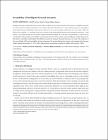| dc.contributor.author | Jeromela, Jovan | |
| dc.date.accessioned | 2022-07-29T13:57:29Z | |
| dc.date.available | 2022-07-29T13:57:29Z | |
| dc.date.created | 4-7 July, 2022 | en |
| dc.date.issued | 2022 | |
| dc.date.submitted | 2022 | en |
| dc.identifier.citation | Jovan Jeromela. 2022. Scrutability of Intelligent Personal Assistants. In Proceedings of the 30th ACM Conference on User Modeling, Adaptation and Personalization (UMAP ’22), July 4–7, 2022, Barcelona, Spain. ACM, New York, NY, USA, 8 pages | en |
| dc.identifier.isbn | 9781450392075 | |
| dc.identifier.uri | http://hdl.handle.net/2262/100346 | |
| dc.description | Doctoral Consortium Paper | en |
| dc.description.abstract | Intelligent personal assistants (IPAs) have become widely available, yet they remain primarily used for discrete, straightforward tasks. By contrast, both user studies and literature reviews indicate that IPAs of the future are to be personalised, proactive, and capable of performing elaborate undertakings. Such systems would have to be based on complex and dynamic user and context models. We believe that scrutability – i.e. the ability of the user to actively study and modify the models towards tuning personalisation – could emerge as an essential element of such a human-assistant interaction paradigm. Yet, to the best of our knowledge, no work so far has investigated how the principles of scrutability, as presented in [21], relate to the context and novel challenges raised by the proactive IPAs and how scrutability could facilitate effort-efficient control of the assistants. This paper introduces our vision of the confluence of the research fields of IPAs and scrutability, presents a diagram of the proposed interaction structure, and reanalyses data from user studies originally presented in [11, 39] to better understand user expectations regarding scrutability and proactivity of IPAs. | en |
| dc.description.sponsorship | This publication has emanated from research conducted with the fi-
nancial support of Science Foundation Ireland under Grant number
18/CRT/6223. | en |
| dc.format.extent | 335 | en |
| dc.format.extent | 340 | en |
| dc.language.iso | en | en |
| dc.publisher | Association for Computing Machinery | en |
| dc.relation.ispartof | IsPartOf | en |
| dc.relation.ispartofseries | UMAP '22; | |
| dc.relation.uri | https://dl.acm.org/doi/proceedings/10.1145/3503252 | en |
| dc.rights | Y | en |
| dc.subject | scrutability | en |
| dc.subject | personalization | en |
| dc.subject | proactivity | en |
| dc.subject | intelligent personal assistants | en |
| dc.subject | user representation | en |
| dc.title | Scrutability of Intelligent Personal Assistants | en |
| dc.title.alternative | UMAP '22 | en |
| dc.type | Proceedings of a Conference | en |
| dc.contributor.sponsor | SFI stipend | en |
| dc.relation.references | References | en |
| dc.relation.references | References | en |
| dc.relation.references | References | en |
| dc.type.supercollection | scholarly_publications | en |
| dc.type.supercollection | refereed_publications | en |
| dc.identifier.peoplefinderurl | http://people.tcd.ie/jeromelj | |
| dc.identifier.rssinternalid | 244877 | |
| dc.identifier.doi | 10.1145/3503252.3534355 | |
| dc.rights.ecaccessrights | openAccess | |
| dc.contributor.sponsorGrantNumber | 18/CRT/6223 | en |
| dc.relation.doi | https://doi.org/10.1145/2395123.2395129 | en |
| dc.relation.doi | https://doi.org/10.1145/3098279.3098539 | en |
| dc.relation.doi | https://doi.org/10.1145/3411764.3445536 | en |
| dc.relation.source | ?What can i help you with??: infrequent users? experiences of intelligent personal assistants. Cowan et al. (2017) | en |
| dc.relation.source | Eliciting and Analysing Users? Envisioned Dialogues with Perfect Voice Assistants. V?lkel et al. (2021) | en |
| dc.subject.TCDTheme | Digital Engagement | en |
| dc.identifier.rssuri | https://doi.org/10.1145/3503252.3534355 | |
| dc.relation.sourceuri | https://doi.org/10.1145/3098279.3098539 | en |
| dc.relation.sourceuri | https://doi.org/10.1145/3411764.3445536 | en |
| dc.status.accessible | N | en |




